Schooling (Home Schooling) Your Expat Kids: Our Ecuador Experience
If you have children and are planning a move abroad you’re probably concerned about their schooling. For us this was not a very big concern, because we homeschool our daughter.
We’ve always had the desire to move to a foreign country, and homeschooling makes for good mobility. We prefer homeschooling for many other reasons as well.
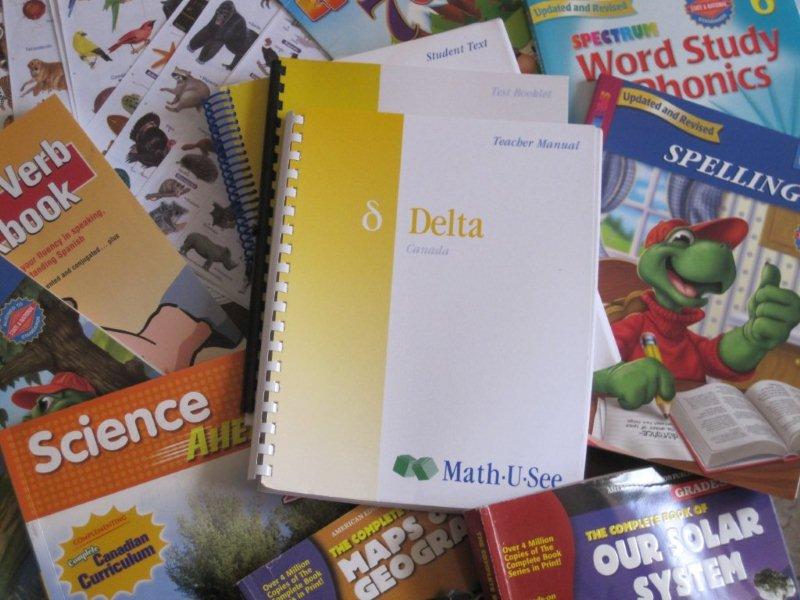
We Were “Homeschoolers” Before Moving to Ecuador
We are from Nova Scotia, Canada and their rules are very simple. We choose the curriculum and have it approved by the School Board, then at the end of every school year we send in a progress report via email.
When we moved we brought two years worth of curriculum with us. And now we ask our family and friends to bring the next years curriculum for us when they visit. We can also order online and have it shipped directly here to Cuenca.
What About Learning Spanish?
You may be wondering how our daughters Spanish is progressing because she’s not in the school system here. Well, I’m jealous!
Her fluency blows mine out of the water; children learn language so much faster than we do. She is 9 and does a lesson in Pimsleur Spanish everyday. (Get a free Pimsleur lesson from Audible) I include Spanish lessons in our curriculum, and we have Spanish books that we read and discuss together.
She also picks up an incredible amount just from being out and about and with her Spanish friends.
This is a concern for most expat families as they plan their relocation.
If you’re into homeschooling you don’t have to worry about your child picking up the language, they’ll pick it up faster than you will.
There are many private schools here as well. But if you do homeschooling make sure to look up the laws regarding homeschooling for your province or state before moving.
Is Homeschooling Right For My Expat Family?
When a family starts thinking about extended travel or moving abroad they may start thinking about homeschooling.
Homeschooling can be a hot topic. A lot of people have strong opinions about it.
If you are thinking about making the switch to homeschooling, don’t be put off by negative remarks.
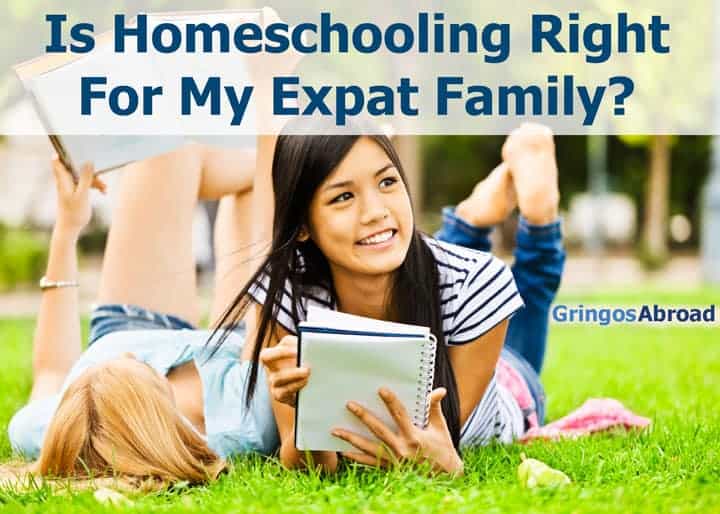
Homeschooling For Expat Families?
I can make positive, well-informed comments about homeschooling because we home school our daughter. She has never been in the school system, and it has been a wonderful experience for our family.
I saw an interesting video not long ago where a young man was talking about his positive experience being home-schooled.
I’ve shared it here to encourage and support families that are thinking about it. Logan LaPlante does not live abroad, but you can get a good idea about the wonderful possibilities open to home-schooled children by listening to his TEDx Talk.
Why Homeschooling Makes Him Happy
It’s so true that our main goal should be raising children who are (and will be) happy and healthy adults!
That’s not to say that children who go to traditional schools can not be happy healthy people, but there is more than one way to educate a child.
Schooling is one of the challenges faced by expat families.
Is Homeschooling Right For My Expat Family?
It is for ours.
There are many different ways to home school an expat child.
When we started we bought the curriculum books ourselves and I sat next to Drew, teaching her five days a week. I viewed it the same way as if I were going to work, it took self-discipline as does any other worthwhile routine.
Now we do what is called distance education, she does most of her school work online with a private school in the States. This has not hampered her language learning because the majority of her social time is spent with Spanish speakers. So while she studies at home, she isn’t technically homeschooled because she is enrolled with an accredited high school.
Many families like to have things very structured and others don’t like structure at all. It all depends on what is the best education style for each family and each child. Many traveling parents homeschool, while others hackschool, unschool, or worldschool.
The goal is the same: to take control of their child’s education.
Some people will say things like “home-schooled children aren’t socialized,” or “home-schooled children miss out on so much!” Those statements are only true if the parents don’t do a good job of homeschooling their children.
Parents should take an active role in making sure their children have good friends and interesting things to do.
Homeschooling made for a smooth transition when we moved from Canada to Ecuador. And it helped as we moved around a bit, settling into life here. Our daughter’s schooling stayed the same which was less stressful for her.
Like the young man in the video above, our daughter is very well socialized, makes friends easily, and has had a very interesting life so far!
(If you have enjoyed this post please help us reach more people by sharing it with your friends.)
The following is a first-hand account by an American expat living in Cuenca since 2007.
Schooling Your Expat Kids: Our Experience in Ecuador
Since we are the parents of two school aged children, education is a concern that my wife and I had to address before we moved to Ecuador. What educational options are available to expat children? Should you enroll your child in a local school? Are classes available in English?
We have always homeschooled our children and when we first moved to Ecuador we had all intentions of continuing our homeschooling routine. However, we were erroneously led to believe that we were required to have our kids enrolled in a school here.
We learned of a private school that would accept our children and quickly, albeit reluctantly, enrolled them. Imagine us trying to explain to our wide-eyed kids that they were going to have to attend a “normal” school for the first time in their life.
Many questions raced through our minds:
- Would our kids be able to understand the teachers?
- Could they make it in a school with an all-Spanish curriculum?
- Would they fit in with the other kids?
I am proud to say that our kids adapted to the challenges of going to school in a foreign country and actually came to enjoy going to school here.
Despite the fact that they did well in their studies here, after 6 months we made the decision to take them out of school and returned to our home school routine.
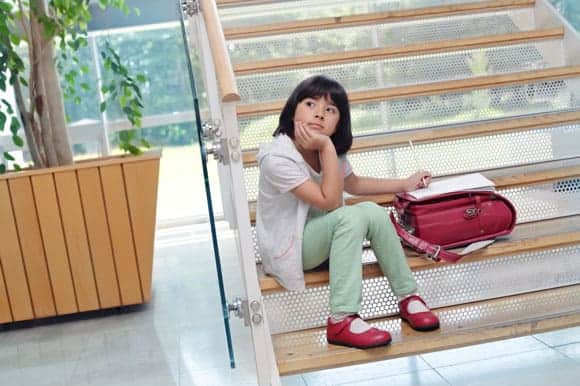
Why did we decide to return to homeschooling?
The main reason had to do with teaching methods and the use of time and energy. The school our kids attended relied heavily on memorization and did not use any textbooks.
A lot of emphasis was placed on things that we felt were irrelevant to a good education, such as the wearing of certain uniforms on certain days and the seemingly endless copying of lessons in notebooks.
If the kids did not copy their lessons with a certain color pen in a particular type of notebook, they were penalized. What difference does it make if you use a black or blue pen? Apparently, it is a very big deal.
They were also required to do what we call busy work, such as the cutting and pasting of drawings and the endless memorization facts and dates. Also, as parents were called to attend meetings that seemed to have no purpose other than to be in attendance.
I don’t mean to sound critical of the education system here. I’m just stating the fact that we found the teaching methods used in one particular school here very different from what we feel is best for our children.
The Ecuadorian educational system obviously has its merits since most all people we know here are literate, creative and well-spoken people.
Many have asked us if there are schools here that offer an English curriculum for non-Spanish-speaking children. If they exist, they are not well-publicized because we have never heard of such a school here in Cuenca.
I recently searched the internet looking for schools in Ecuador that offer an English curriculum and my search turned up nothing. I have asked a number of Ecuadorian and expat friends about the matter and no one has reported having heard of an all-English school here.
There are many schools that include some English language instruction, but apparently, there are none that offer an education exclusively in English.
What we do know is that there are many internet-based home school options for expat children. Our daughter is enrolled in the first year of high school and when she finishes will receive a diploma from the State we lived in.
Some states offer online schooling via the State board of Education that is free. The course we use for our daughter’s high school is through a private college and the cost is very modest. All of the lessons are available on line and they are reviewed by a certified teacher.
Aside from the internet homeschool option, there is also a seemingly endless supply of printed material and programs available, especially for the early grades. Each state in the U.S. has its own standards and requirements for homeschooling.
Before moving to a foreign country with school age children, it is best to be informed about the requirements of your particular state or province. Some states require homeschool parents to keep monthly attendance reports. Others require tests to be taken from time to time.
If one has an internet connection or access to printed material, the educating of expat children need not be an insurmountable obstacle when considering a move to a foreign country. Also, if you move to a country popular with expats, such as Ecuador, you may find retired educators who are willing to offer tutoring services to expat children.
There is one factor that should not be overlooked when one considers moving to a foreign country with children.
Whether you home school or enroll your kids in a brick and mortar institution, it is good to remember that living in a foreign country is an education in itself. There are many lessons that a child can learn living abroad that cannot be taught in a classroom.
Younger children become bilingual almost overnight when they are immersed in a foreign language and are forced to speak it in order to make friends. Also, most expat parents have much more time to dedicate to their family and when parents are actively involved in the education of their children the results are always positive.
Life is a classroom and we are thankful that we have the privilege to live in a culture-rich country that is full of unique and interesting people and places.
Your Turn
Are you a homeschooling expat family? Have you thought about homeschooling? What’s your opinion? Please share by commenting on this post.

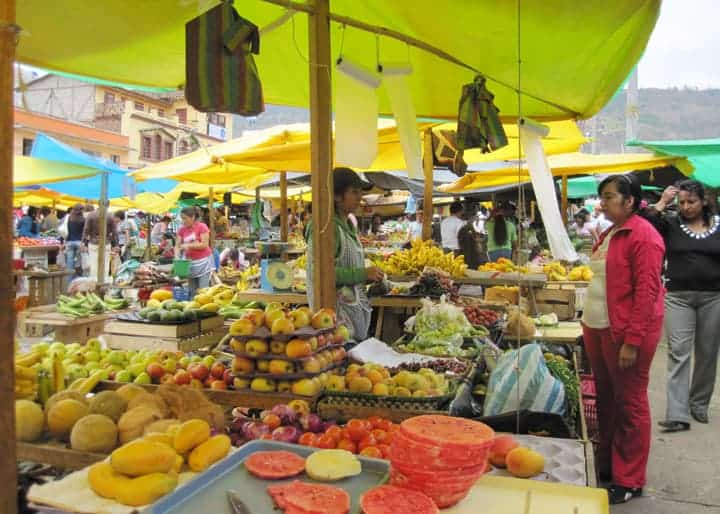
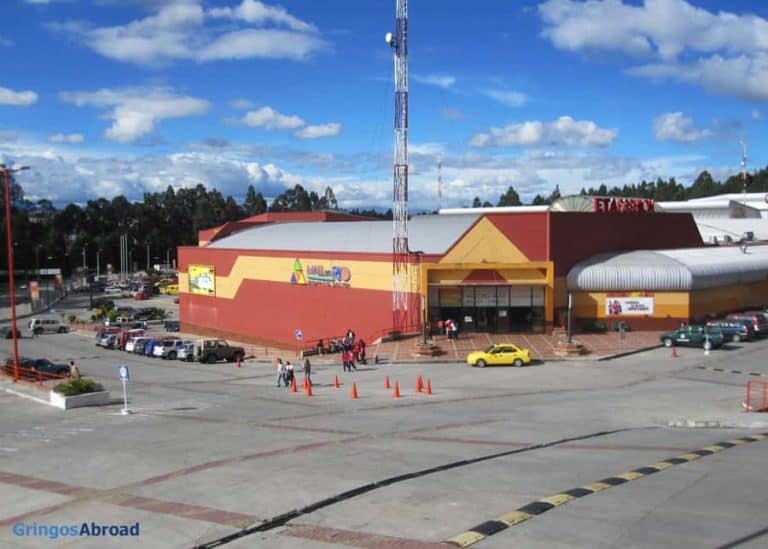
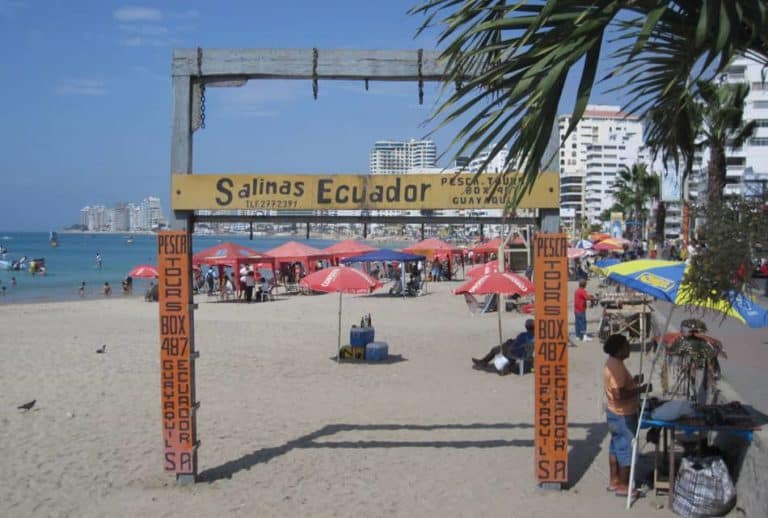
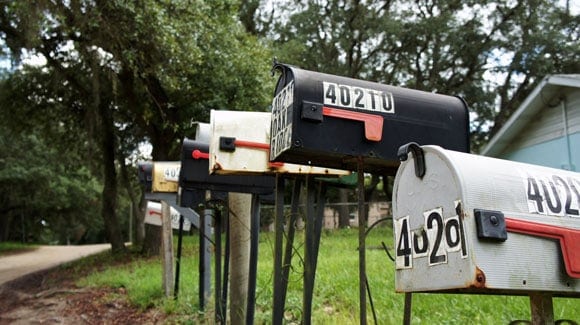
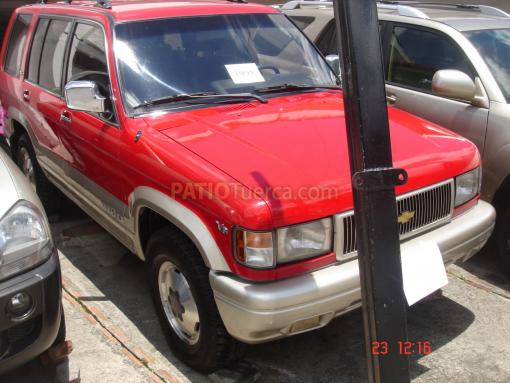

Hi there!
We recently moved from south Florida to Quito. I have a 3yo (almost 4) and 8mo twins. We are getting prepared for homeschool our oldest and we are considering moving to Cuenca next month.
We are going to visit Cuenca to look for some rental properties next week and I was wondering if you have any advice on areas that you would recommend for homeschooling families? Places to gather with homeschooling communities?
Thanks,
Sara Medina
Our child has been homeschooling since day 1. 6th grader now in the United States. Do we need to have it approved in Ecuador to move or just continue as is?
I can relate so much to what you posted in the article. My husband and I orginally from Canada and moved to Ecuador 11 years ago. We now have 2 children and the questions of schooling has been on our minds since the day they were borned. After attempting to homeschooling and putting our children in a local school we decided to open a Alternative English Curriculum School in Ayampe called Roots and Wings. At the moment we are open to children 3-9 but are expanding each year. Here is our website http://www.rootsandwingsayampe.com Hope this helps some families out there. Take care
Thanks for sharing this Vanessa!
Hello, thanks for the information. My family is moving to Cuenca this summer and we are enrolling our children at CEDEI, which does 40% English instruction.
Where I’m struggling is getting my children approved to study through the Ministry of Education. What was your experience? Did you do everything in person? Where there any difficulties? How long did it take to get permission from the Ministry of Education?
Thanks!
Rusty
Hi, what was the final word from the Ministerio de Educación? With the quarantine we are thinking of homeschooling this next academic cycle and would love to know more about your experience with the curriculum registration process.
hi
i want to find out if there is an american school in cuenca ?
hi, i am lourdes cornejo…and i am from ecuador. I live in guayaquil…and there is an american school here in guayaquil..its called..interamerican academy….these school is specially for kids that come from other places and as long as i know it has a USA schedule…it is addressed in via a la costa…urb puerto azul….unfortunatelly I lost their phone number but if you want it you may google it…take care..
We are considering moving our family to Exuador from the US. We currently are active in a wonderful, conservative Catholic Homeschool group. Since Ecuador is very Catholic, when I Internet search for “Catholic Homeschool Groups”, so much comes up. Is there similar homeschool communities that I can connect to? Any suggestions of how to search for them? Maybe to a expat Catholic homeschool groups? We definitely want to immerse in the Spanish Ecuadorean culture but need help connecting with likeminded homeschoolers just to start. Thanks
Hi, I’ve read someone said homeschooling is not legal in Ecuador and make it clear that it isn’t illegal either as our constitution gives parents the right to choose how kids should be educated.
Schooling kids, in legal terms, is not seen as an obligation (as in Spain). There is no law about sending kids to school. All the laws in our constitution are about education (not schooling). The legal procedure that has been mentioned is just in case you want to have grades and certificates each year. If you don´t care about it, there is no legal way they can pressure you to send kids to school.
We visited Cuenca in Jun 2013 and loved the place. We plan on moving there but one of concerns is that my daughter is Dyslexic. We plan on puting the children in private school, does anyone have any experience with or understands how Ecuadorian schools manange/help those with Dyslexia? We were told she may need private tutoring to help her with reading but besides that not much informtion was provided. Appreciate any help/advice.
I haven’t heard specifics about Dyslexia but in general it seems that public schools seem to try to fit all the students into a specific mold – I guess it’s much like many other countries. There are lots of options for private schools. Maybe a combination of a quality school and a private tutor will be what your daughter needs?
Thanks Bryan, that’s pretty much what I was thinking but still have concerns i.e. taking exams. BTW when we were in Cuenca our paths crossed a couple of times but my husband and I did not think you would appreciate a couple of strangers accosting you 🙂
We don’t mind chatting with other expats and travelers. It happens all the time in Cuenca.
All the best on your plans!
Thanks Sima.
Sima… Given experience from my own family, students with any kind of special needs are largely ignored by the system. There is no extra attention given. If you find helpful teachers or school representatives it will be out of their own kindness, but not because there are any structures or procedures in place that would warrant that. You will have to take it upon yourself to provide or find the necessary support for your daughter.
The educational system is currently in a phase of large scale reform with qualification requirements for educators being upped a lot, new specialized institutions being founded, and old ones being closed, but we will have to see the results a few years down the road. I am also seeing most of it happen on the tertiary education level.
Thanks Jakob, that’s pretty much what I figured. We’ll have to explore all our options. I appreciate the response.
Sima
Hi. We have a homeschool here in Cuenca, Ecuador. We follow an American online curriculum, where students can take Spanish as a second language. We offer one-on-one classes, using interesting lesson plans and worksheets. If interested in homeschooling for gr. 2-5, please send me an email to ybrazer@yahoo.com
Hey there–my wife and 2 kids (girl 9, boy 13) and I are coming to Cuenca in a couple of months, and wonder whether we could connect with other homeschooling families there. We’d like to put the kids in some afterschool and weekend classes/activities as well–they need to be with other kids, and homeschooling where we are in the US is pretty good for that (lots of other homeschoolers to connect with and classes to take), so we are hoping we might find something similar in Cuenca. Does anyone have any ideas?
if you can afford it there is a school in guayaquil that has american school curriculum .. http://www.interamerican.edu.ec/
Hey Bryan, thanks for the article. I am from the U.S. but am in the process of marrying an Ecuadorian woman. Will we be able to homeschool our children in Ecuador? This is a very big factor for us in deciding where we will ultimately live, so I am curious if you have any direction for us. It sounds like it is possible, but is that just some exemption for ex-pats with children our would we be able to do that too? Where would I find more info on what I would need to do (paperwork, etc.) to play by the rules. Many thanks. Luther
Foreigners can homeschool as they don’t fall under the regular rules. I’ve heard that even the national department of education is encouraging nationals to homeschool in some settings. Because your wife is an Ecuadorian national this might change the rules – you would be best to confirm with the government directly.
Hi.
I just want everyone to be aware that homeschool is NO longer legal in Ecuador but for 4 exceptions:
a. Kids that have serious /chronic illness and therefore cannot attend school-
b. Athletes on a national competition level, that need to be training or in competitions
c. Children of foreigners that do not speak spanish AND ONLY for the first year.
d. Sorry, I did not write that one down.
The law changed around december last year. I spoke to a person in the national education department about this not three weeks ago.
Now, THAT being said. Ecuador is a very “there’s always a loophole” country. I was adviced, BY THE SAME person that told me homeschool was illegal, to do this:
a. Go to a public school. (there’s one a few blocks away from where I live)
b. Explain to the principal, that your kid wants to join the school but you travel too much to attend regular school. And that you spoke to the education ministry and THEY said to enroll the kid on a distance education basis. That you will bring the kid ONLY to the “quinquimestre” exams (exams to determine whether the child can be promoted to the next grade), and you need the school to give you a certificate that says you asked to be enrolled.
c. Go to the regional education office with the certificate, AND a letter writen by yourself explaining why you NEED (not want) to do distance education. Ask them to: a. Give you a certicate that you have explained the situation and the kid is allowed to take the exams. OR get them to sign and stamp the certificate the school gave you.
d. Go back to the public school, present the regional document or signature. ASK to be informed when the exams are.
e. Go to the exams. If the kid passes, hurray, you will get the certificate.
I did most of the steps above. (I am currently waiting for the regional office to extend the certificate) The principal at the public school was VERY kind to me. This is a very poor school. I got the feeling that, and he does not want more “not normal” kids (mine has a slight speech problem) an thus was very accommodating. (I dont blame him, the Ecuadorian goverment has been changeing all the laws and curriculum, and now special needs children need to be “included” in regular classrooms, but no training has been given to the teachers)
The whole process is free. We offered to but a kid in need all the school supplies needed for this year, and the principal was really thankful. (But this was AFTER he gave me the certificate, I did not have to bribe him, which actually surprised me)
The person in the ministry is (name removed by request)
I also talked with a private but small school here, in case things do not work out with the regional office. I offered to pay their monthly fee (80 usd) and annual quote (100 usd) to get my kid enrolled as a normal student, but for him to take only the two needed exams. The school had no problems with it.
So. We are happy. We are legal. We are homeschooling.
Hi and thanks for this detailed information. What is the name of this private school that charges $80 per month, is this school in Quito and bilingual or what?
Thanks
Hello, Thank you this was informative. I am planning to move to Ecuador with my 8 and 13 year old who are currently homeschooled but thought about putting them in school but sounds like US schools. Planning on going to Porto Viejo, if any one has any info and links to meet other expat families with kids and schooling, trips etc., It would be great!
OK, good to know. I will look into it further (and leave a reply comment here when I find out for sure).
Brian, Will this affect if my children are Ecuadorian residents?. They were born in the USA but plan to process their Ecuadorian residency. My husband and I hold dual citizenship.
From what we understand, as residents (and not citizens) we are outside of the local rules. That being said, it isn’t hard to enroll your child in a school online and then they aren’t actually home schooling but they are taking distance education.
I come to Cuenca this month and I searching more homeschooling families to be in contact because I have educated my 3 childrens since 12 years ago and we continue with it. Please can yo tell me how contact you or other homeschool families??
Hi, I live close to cuenca i am in azogues and this september i am starting homeschool with my three children they are 11, 9 and 6 years old and they speak english. we can meet in cuenca i am en cuenca almost every day.
Just curious if there is a large community ex-pat kids to plug into? I thinking of relocating with Girl (11) and Boy (13). Only English-speaking and I would do distance learning in the interim. Making friends and having a social life for them is important to me.
We have recently moved to Quito, Ecuador and would like to know if anyone knows of any support groups for homeschooling moms?
Hi. We live in Sangolqui and we are planning to homeschool our child using Waldorf education. He is almost 5 years old and we are a bilingual family.
Would love to meet other homeschooling moms. Best if they use Waldorf!
My husband and I just finished a two week stay in Cuenca. We both enjoyed ourselves immensely and are now at the point that we have to make a decision of whether to move or not. We have one question that has a huge bearing in our decision – how will this impact our children. I know no one can answer this question, but we were not able to get much information on schooling while in Cuenca. My children do not want to homeschool because they want to be able to make friends. Is it possible for them to make friends in Cuenca and be homeschooled as well? If so, how?
The language is a barrier to us as none of us speak Spanish. Therefore, enrolling my children in school here may not even be an option until they are fluent in Spanish. Does anyone have any advice on that? What I had been told while in Cuenca is that most private schools won’t accept kids in the middle of the year, simply because there is no room. That leaves the only option as homeschooling until next year. The thought of homeschooling equates itself in our minds to isolation.
If anyone in this forum has any advice on moving, in the middle of a school year with non-Spanish speaking children, please let me know. Also, how can we make friends and not be isolated and homeschool for a year if we have to. I would welcome all advice/opinions, both positive and negative. We have two daughters aged 12 and 14.
Thanks.
Hi Kathy, you have good questions. I understand your concerns. Our daughter is home-schooled and has lots of friends. Homeschooling really puts the responsibility on the parents to get involved and give the kids opportunities to make friends. But it certainly isn’t for everyone.
Hopefully other readers will be able to share their experiences and advice…
Bryan
While I cannot help you with home schooling I was one of those kids brought into a foreign country without speaking the language (German in my case, I was 10). My mom put me in a regular local school right away. I did not understand a word the first 3 months, but it put the necessary pressure on me to learn. I passed the year. In total it was 2 years for me from zero to fluency. The older you are the longer that time will be, but I am happy my mom trusted the ability of a kid to learn intuitively and did not try to protect me from new things.
26 years later many of my best friends are from that school and that time. I would have never known them without going there.
I am also out of touch with my original culture. My country of birth is not very relevant in my life anymore. I feel I am different than they are, so yes, your kids will undergo a transformation of values and mentalities. It can lead to a culture clash with your own kids at some point. What they will learn around them won’t necessarily be in line with your values. They might also be confused by those discrepancies as they try to blend the culture at home with the culture outside. I had some serious crisis moments based on my origin. I badly wanted to fit in, so at some point I refused to speak my original language even at home and my mom had to make me. Your job as a parent will be a bit harder, probably less so with the 14 year old.
Hi!
Even though we are native spanish speakers, we decided to homeschool our ex-pat kid. We live in Guayaquil, and we could not find a school that was right for us. Besides, he had a speech issue to take off before school. He took him our of school two months before the end of the year and have not sent him back this year either.
Now. I believe he now has MORE friends that before. We have time and energy and money to join all sort of activities, like his speech therapy, tae kwon do, football and others (besides our “field trips” to nature, people offices to see real work, etc). Kids are way more relaxed in these activities, and there is, so far no bullling whatsoever, quite on the contrary.
Homeschooling, I believe, is a GREAT alternative here. Most of the expat kids I know do not LIKE the teaching here (from different schools) cause the teacher is still expected to know everything and for its very catholic roots.
If you are lucky enough to be in Cuenca, where there are other homeschoolers, you might want to have your kids join them in proyects, plays, field trips and so on. Look at some of the homeschooling communities in the US to get an idea of how much fun it can be, show your kids. They are probably not fully aware of the possibilities. 😀
If you need any advice on programs for the US, try http://www.thehomeschoollounge.com/ they are a wonderful community!!!
Hope that helps!
We are considering a move to Cuenca but have never visited. I’m trying to find out as much information as possible and am having some difficulty finding some information. What I can’t figure out is the schooling situation. I’ve seen several school websites but cannot read them as they are in Spanish. Also, my computer will state that it’s been translated to English but has not. Can anyone please tell me if Ecuadorian schools are grades 1-12 just like US? What kind of education does a child need to attend South American colleges? Are there standards for English, Math, Science that we should be concerned with if we homeschool?
I don’t think my kids want to be homeschooled but I can’t figure out how to even go about taking the first step where to send them to school.
If there are any expat moms and dads living in Ecuador that can help me figure out the schooling situation, please do so.
Thanks so much.
Kathy… I won’t comment on homeschooling as that is a concept totally unknown to me, but I can maybe help comparing school systems. Personally, I attended high school in Canada, France and Germany only, but my wife and my nephews have passed through the Ecuadorian school system and my siblings have gone through the US school system, so I have an opinion.
First of all, let me start off by saying that “college” is a North American concept. In most other countries including Ecuador what follwos after grade 12 is university. There are preparatory courses and entry exams in Ecuadorian university before you are admitted to the actual major (in North America many students would be in College at this point). This is also the reason why it is much wiser to get a university degree and not a college degree if you think internationally. A college will have to be explained to many people in Ecuador and some will not see your degree as a fully equivalent academic degree. Point is, you don’t go to college in Ecuador, you go to university and you need to graduate from grade 12 + pass the university’s entry exam to be admitted.
The Ecuadorian school system has 12 grades just like the US. This seems to be the preferred system worldwide by the way with most countries finishing secondary education at grade 12. When it comes to sciences and math the material seems very similar to what kids in North America and Europe learn. My personal impression is that the material might be slightly more demanding than North America and slightly less demanding than what European students are asked to do, but the underlying concepts are the same. Languages are a different story since English is not the first language. Your kids will need to be fluent in Spanish as fast as possible to be successful. Foreign languages such as English are part of the curriculum, but honestly, foreign language education is just as terrible in Ecuador as it is in the US (for example Spanish in the US or English in Ecuador). The level is very low in both countries. Having said this there are private schools that are French, German, American etc offering bilingual or even trilingual education that works.
There are a few peculiarities with the Ecuadorian secondary school system compared to the US. One thing is that secondary schools have a specialization. For example, my wife’s secondary school specialized in bilinguial secretariat, in the same way other schools would specialize in accounting or sciences for example. My nephew is at a secondary school affiliated witht the military. The students there bear arms and receive military training starting age 15. Therefore, your choice of school will influence where the focus is as opposed to an entirely comprehensive system like in the US. All Ecuadorian school children also wear a uniform. While you are wearing your uniform you are bound to the school’s rules of behaviour even if you are out on the street. The school will punish you for inappropriate behaviour outside of school premises if you were wearing the school’s uniform at the time and Ecuadorians often will report your kid to the school if they mess up no matter where. The school is an authority and obedience is much more important and enforced in a more authoritarian way than in American schools. It reflects their family values.
Another thing is that I find Ecuador is a bit slow modernizing their curriculum. There was typewriting long after computers were standard around the world for example.
I do think that what your kids have learned in the US is transferrable to the Ecuadorian school system and your kids will be able to pick up where they left off. The key to that will be how fast they are able to become fluent in Spanish and that in turn will depend on how old they are. From my personal experience, if you don’t want them to lose a year they will have 6 months from zero to fluency if they want to pass the year and not repeat. This is possible for a kid that is 10 years old or younger, but you have to preferrably chain them to a book (been there done that).
One last word maybe, when I was a kid and my mom brought me into a foreign country the pillar of my lightening fast integration into the local culture and language was (apart from my young age) daily exposure to it at school. Language and cultural integration is key to future success. I can imagine you slow that process down considerably if you home school your children.
I have a 5 y.o. daughter and hope to relocate to Ecuador next yr. I need to find a rental on the beach with security close to the market for walking. I will homeschool as I have done with my older children. I am concerned about medical facilities, receiving meds in the mail(I am a veteran of the Navy)get my meds from the VA. Can I drive my car,how hard to buy a car,or rent. I like the colonial life and simplicity. don’t need alot just need to feel safe, 2 b/r 2 bath privacy in backyard walking distance to beach. thank you for your help….judith and Alessandra.
Judith… I notice that you are oriented towards the coastal region. You have to know that the coast in Ecuador is different from the mountains in terms of climate as well as lifestyle and mentality of the people. Most expats settle in Quito or Cuenca which are in the mountains and their experience will be different from yours if you go to the coast.
One of the issues is that the the immediate vicinity of the beach has no major urban centres and most of it still feels fairly remote with the exception of Manta maybe where a former US base was located. If you are not in Manta or Salinas some services such as car rental or a fully equipped hospital can be hard to find. Buying a car is not a problem, but you will find that acquisition costs will be a lot higher than in the US. Maintenance costs will be lower. Car rental for an economy vehicle (manual, there are no automatics) should run around $40 – $45 a day. However, be advised that in Ecuador when an accident happens and the damage is greater than $400 or someone is hurt the law dictates that the drivers be arrested until the guilt question is clarified in court which can give you several days in prison for a traffic accident before your matter is heard. How do I know this? I was arrested after being rammed by a motorcycle driven by a drunk guy who had no driver’s license. I could give you lots of details about the legal situation in Ecuador at this point, but I’ll skip. I tend to take the bus more nowadays which is cheap (around $1 per 100 km of travel) and the frequency of the buses is excellent, even inter-provincial buses run often.
If you receive meds I would go with a PO box, not trust for it to be delivered to your door.
Generally, the unsafe areas of Ecuador are in the country’s biggest cities (especially Guayaquil), you should not have a security concern close to the beach. You as a foreigner can own your own house with privacy in your backyard and if you can walk 10 minutes to the beach as opposed to being directly on it the prices are not too bad, yet, either. However, privacy is defined a bit different in Ecuador. You will need to make friends with the locals to lead a normal life and let’s say people in US neighbourhoods tend to live next to each other while people on the coast in Ecuador tend to live more with each other. Once you make friends they will be at your front door inadvertently and often and will take great interest in your life. Why should you have to call ahead and schedule to visit a friend? Strangers do that 😉
To find a long term rental I would probably go down there and search personally. Ecuadorians might have totally different criteria when looking for a property, so even if you have a local person you can trust they might describe a horse what later turns out to be a cow. Travel the coast between Salinas and Esmeraldas and personally pick a place.
Hi Judith, I am chilean and live in Ecuador. I agree with Jacob, there is no good hospital in the coast (Santa Elena, montañita area) except in Manta.
On the other areas, however, I tend to disagree. I have drove here since I got to the country, both in the coast and in the city, and never ha any problems. Seems to me that if there is traffic accident with people injured, lots of countries will take you into custody. (that being said, I dont want to imagine prisons here!) Now, if you honestly want to get some tips on how to handle such situations write me a private message and I will elaborate.
With meds:
1. We manage to get them send (six months supply) with friends coming by plane. Also, you embassy might be of great help in that area, since they have diplomatic mail allowances.
2. There is a service called Club correos which gives you a PO box in miami and then delivers the pack right to your door.(regular mail is VERY unreliable) We have worked with them for a year with no problems whatsoever. They charge 10 usd a year for the pb box and then for each delivery (depends on the pack) They even track your pack within the US. Not sure if they would deliver meds, but worth checking, specially if you can do it through the embassy too.
3. Meds are cheap here. You might just want to buy them and save the hassle. nor sure if its the case, but also worth checking. If you send me a list of the medicines, I can check next time I go to the drugstore.
Not sure what you mean by “colonial” life, but places like Olon, Oloncito, Ayampe and others and extremely quiet, calm and relaxed. I guess the main catch is the hospital thing.
hope it helps.
Victoria
Victoria… I often drive in Ecuador (but not as often as I used to) and I never had a problem until I got into that accident. It was an eye opener. In my home country it is not considered normal to be taken into custody for a traffic accident, even if people are injured. Having said this in Guayaquil those cases are handled by the Comision de Transito, they have their own installations. The fun part is when it happens to you in rural areas where the Policia Nacional handles all matters including traffic. They lock you up together with serious criminals for a day. In my case the problem was exacerbated by the fact that it was between Christmas and New Year’s, so judges and lawyers are not as motivated to work. In some parts of Ecuador, if a holiday strikes and you are locked up some people just leave and you are out of luck unless you put serious money on the table to “motivate” them to process just that one more case. You will not know this until it happens to you.
There is the British School in Quito with all english curriculum and the Academia Cotopaxi in Quito. Both offer the IB and almost all the teachers are native English speakers from the US, Canada, GB, New Zealand or other English-speaking nations.
Thanks for sharing this! Appreciate it.
I don’t know about Cuenca, but in Guayaquil you have the following:
http://www.colegioamericano.edu.ec/
I also saw a french one driving by, and the in Guayaquil most famous for providing excellent education German Colegio Humboldt which actually is trilingual in class delivery (spanish, german AND english):
http://www.cahgye.edu.ec/
Thanks Jakob – this is great info!
Bryan
My wife and I are visiting Cuenca tomorrow, May 9th and we were wondering if you have any suggestions for us? We will be taking public transportation and arrive in Cuenca approximately 10 am?
Hi Don – Guess it depends on if you are coming as a tourist or a potential expat.
As a tourist: You shouldn’t miss town center and Parque Calderon. Also, Avenida 12 de Abril is a beautiful walk along the river. The Sankt Florian restaurant on Calle Larga (just above Avenida 12 de Abril) is a family (and expat) favorite.
As a potential expat: Its worth taking the time to check out SuperMaxi and Mall del Rio. It will help you picture whats here.
Enjoy your time here!
Two schools that might be of interest to your readers, both having been accepted to the worldwide IB program and teaching almost exclusively in English in certain grades are:
http://www.santana.edu.ec/
I’ve heard good things about both.
Thanks Tiffany – this is excellent!